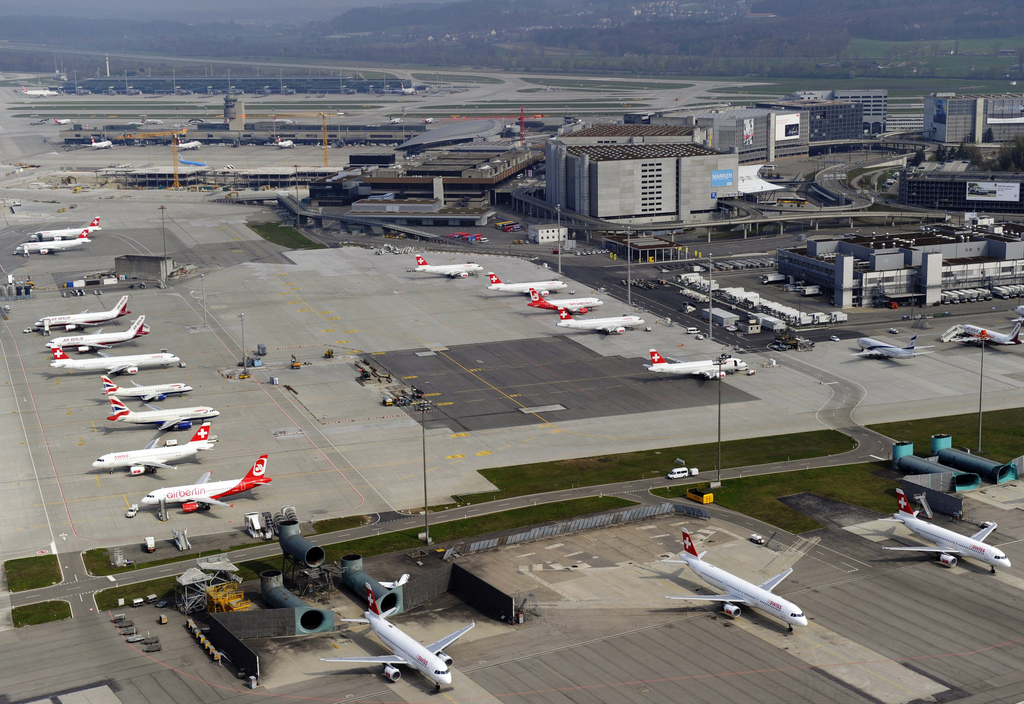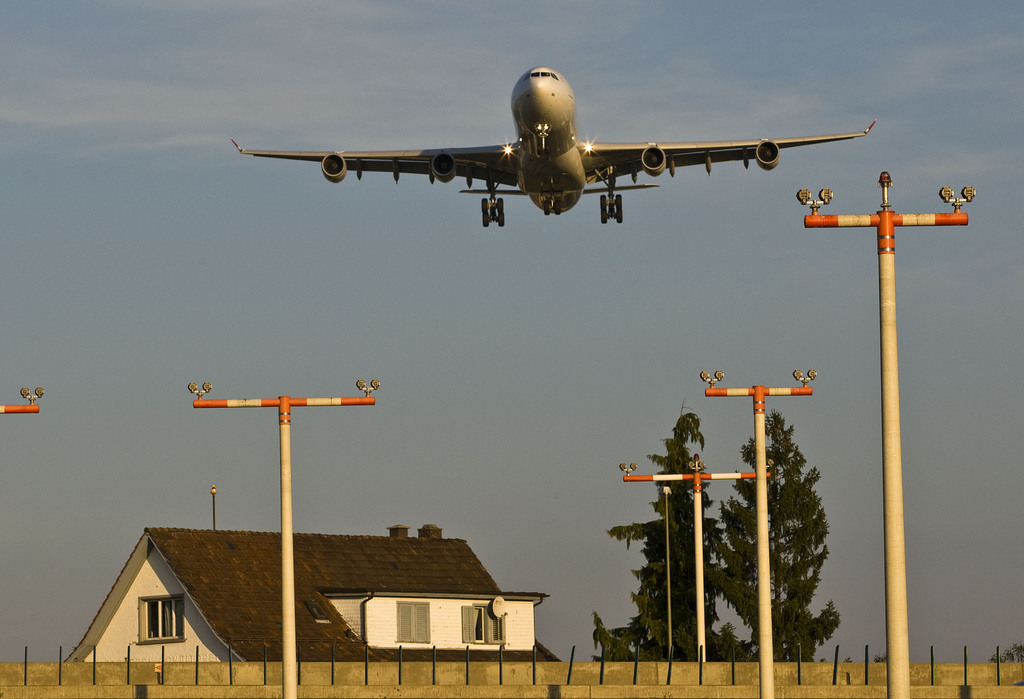Clouds gather on soaring aviation’s horizon

The figures speak for themselves. Switzerland’s airports are essential for the economy of the landlocked nation, with an impact estimated at around SFr10 billion. But capacity and infrastructure concerns at Zurich and Geneva threaten competitiveness.
Despite the uncertain economic climate and strong Swiss franc, these are high times for Switzerland’s three international airports – Zurich, Geneva and Basel.
An economic impact study published in May 2011 by the Civil Aviation Office showed that the three international and four regional airports had a combined economic effect of at least SFr9.7 billion ($10.35 billion) in 2008 – up from SFr6.7 billion in 2004. Zurich is responsible for 62 per cent of this total, followed by Geneva (20.4 per cent) and Basel (13.3 per cent).
These figures include direct effects produced by airport activity and companies based there, the indirect effects of suppliers and services, and the wider multiplier effects of income and profits as well as improved accessibility.
And profits continue to soar, as do passenger volumes and flight movements, which are largely driven by Swiss frequent flyers: passenger traffic per capita in Switzerland is twice the European Union average.
“We have quite strong demand from inside Switzerland and this is attractive for airlines,” said Martin Peter, an independent aviation consultant.
The number of local passengers rose by 2.5 per cent at Zurich airport and the number of transfer passengers was up by 4.4 per cent for the first half of 2012 compared to the same period last year. The flag carrier Swiss International Air Lines has started daily flights to San Francisco, Newark and Beijing, and British Airways has also increased capacity in Zurich.
Growing Geneva
And despite plans to slash up to 100 administrative staff in Switzerland, Swiss also wants to refocus part of its operation on Geneva to compete with low-cost carrier EasyJet, which has a 38 per cent market share in the international city and a whopping 48 per cent in Basel.
In the Geneva region, the low-cost operator has an economic impact estimated at SFr1.4 billion, according to a report published in September by the BAK Basel economic research institute.
All together, the three international airports generate a growing number of jobs. At Zurich, for example, almost 25,000 people are currently employed in aviation jobs. According to the study, in 2008 some 82,520 other full-time positions were related to activity at the international hub.
“If you look at the number of jobs and volume of added-value activities, it’s quite impressive, but the overriding importance of Switzerland’s airports is strategic,” said Daniel Müller-Jentsch of the Avenir Suisse think tank. “They are essential infrastructure for a land-locked global economy like Switzerland, which depends so much on international headquarters.”
Awards and dispute
Over recent years huge transformations have been made to the infrastructure and travel experience at Switzerland’s main airport.
Awards for excellence continue to fly in. For the ninth year in a row the travel industry voted Zurich best European airport with the 2012 World Travel Award.
But many Zurich residents and Germans living just north of the border probably disagree. Noise pollution has been a hot topic ever since many aircraft were re-routed from flight paths over southern Germany in 2003.
Switzerland and Germany finally sealed a deal in July, which requires parliamentary approval from both sides. It foresees a reduction in flight hours during which planes taking off and landing in Zurich can fly over German territory.
The accord will require runway extensions and other flight path changes by 2020. But observers fear it will meet strong local and German opposition; there are concerns it may lead to restrictions on air operations at Zurich.
On November 26 German Transport Minister Peter Ramsauer threw a spanner in the works by announcing Germany wanted to discuss “open questions” not covered by the agreement.
Capacity concerns
According to a comparative study published by the Civil Aviation Office in November, there are more threats to the airports’ competitiveness, which could be damaging to the Swiss economy as a whole.
The report said while the Swiss aviation sector provided above-average efficiency and quality, the system was “reaching its capacity limit”, especially at Zurich and Geneva.
The sector risked losing ground to European competitors which had more than one runway and could extend infrastructure, it added.
Hansjörg Bürgi, editor of skynews.ch, agreed with the report’s general findings but said Geneva and Zurich were two distinct cases.
“Geneva has only one runway and so is slowly running out of capacity. Zurich could have a much greater capacity if it could fly as it liked, but with all the political restrictions it has to scale down and in a few years’ time with the [Switzerland-Germany] deal there will be severe restrictions,” he added.
Geneva airport has geographical limits with no free land to build, admitted airport spokesman Bertrand Stämpfli, but current space permits “growth over the next 20 years”.
The spokesman said the airport was focusing on optimising flight movements and time on the ground. A new eastern wing is also planned for more long-haul flights.
Experts say in its current configuration Zurich may reach its capacity limit – 350,000 annual flight movements – in ten years’ time if traffic growth continues as planned.
“For us it’s clear where we have to go,” said spokeswoman Sonja Zöchling. “If we get approval from Germany and Switzerland we need to extend the runways.”
But for Transport Minister Doris Leuthard the future outlook remains gloomy.
“I really see problems as Paris, Munich and London always have airport alternatives, but we are a small country with space limits,” she told swissinfo.ch. “What path do we want to take? Perhaps we just have to accept certain limits.”
Switzerland has three international airports, ten regional airports (including Bern, Lugano, Sion and St Gallen), 47 airfields and 24 heliports.
In 2011, they totalled 963,901 aircraft movements and over 42.9 million passengers. The airports transported 394,423 tons of cargo.
Zurich airport is the biggest in Switzerland and is less than 20 kilometres from the German border. Swiss International Air Lines – and thus its mother company, Germany’s Lufthansa – is the largest flight operator there.
The airport generated a profit of SFr171 million in 2011, handling a record 24.3 million passengers – 6.4 per cent up on 2010 – largely driven by Swiss travellers. Transit passengers rose to 8.3 million.
Geneva airport smashed the 13-million passenger barrier in 2011; this year the number of travellers look set to grow by 6.5 per cent. It recorded a profit of SFr64.6 million in 2011. EasyJet is the biggest airline with 38 per cent of market share.
EuroAirport Basel-Mulhouse-Freiburg is situated six km northwest of Basel on French territory. It is one of the few airports in the world operated by two countries: Switzerland and France.
In 2011 passenger numbers reached an all-time high of five million and grew by nine per cent for the first half of 2012. Net debt dropped from €93.6 million to €66.2 million. EasyJet is the biggest airline with 48 per cent of market share.

In compliance with the JTI standards
More: SWI swissinfo.ch certified by the Journalism Trust Initiative














You can find an overview of ongoing debates with our journalists here . Please join us!
If you want to start a conversation about a topic raised in this article or want to report factual errors, email us at english@swissinfo.ch.